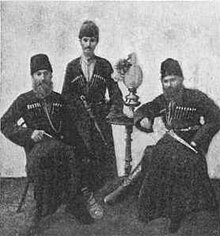|
History of the Jews in Derbent
The Jewish community in Derbent, in the Russian Republic of Dagestan, is the oldest in the North Caucasus and dates back to the 7th century.[1][2][3] A large influx of Jewish immigrants occurred during the Russian Civil War (1917-1923). Most Derbent Jews immigrated from the mountain and steppe villages of the northern Caucasus.[1] History  Antiquity and Middle AgesThe Jewish population of Derbent and its neighborhood are descended from a military colony established by the Persian emperor Khosrow I in the 6th century.[4] Under the Khazar Khaganate the Jewish community of Derbent increased.[4] The ancestry of the Mountain Jews also includes later settlers from Iran, Iraq and Byzantium.[5] Jewish-Khazar correspondence, in particular the Schechter Letter, also mentions Derbent and local Jews in the process of accepting Judaism by the Khazars.[citation needed] The medieval-era Jewish merchants played a significant role in the activity of the Silk Road.[6] Derbent was one of the centers of early medieval merchants during and after the Khazar Khaganate.[4] The Jewish community of Derbent was described by travelers including Benjamin of Tudela in the 12th century and William of Rubruck in the 13th.[7] After joining the Russian EmpireIn the 18th century, Jews were persecuted during the Russo-Persian Wars, and the Persian ruler Nader Shah forced many Jews to convert to Islam.[8] After Russia conquered Dagestan, many Jews concentrated in Derbent[9] and the city became the religious center of the Mountain Jews.[10] Rabbis of Derbent, Eliyahu ben Mishael Mizrachi (1781-1848) and Yitzhak ben Yaakov Mizrachi (1795-1877) were known for their scholarship.[11] Rabbi Yaakov Yitzhaki (1848-1917)[12] in the 1870s established contacts with the Jewish scholars of St. Petersburg. In 1907 he emigrated to Eretz-Israel.[12] The Derbent rabbi Yaakov Yitzhaki led a group of Mountain Jews from the Caucasus and founded an agricultural settlement in Be'er Ya'akov, Israel. In 1907 the settlement was named after Yitzhak.[12] Approximately from the middle of the 19th century, the Rabbi of Derbent was recognized by the Russian authorities as the Chief Rabbi of the Mountain Jews of Southern Dagestan and Azerbaijan.[13] The main occupation of the Jews of Derbent was viticulture and winemaking, madder cultivation, which fell into decline by the end of the 19th century, and fisheries since the beginning of the 20th century. The largest fishing company in Dagestan was owned by the Dadashev family.[4] Though most Ashkenazi Jews in the Russian empire were denied the right to live outside the Pale of Settlement, from 1860 some of those who had permission to do so settled in Derbent.[14] The Jews of Derbent conducted a large wholesale trade, mainly in agricultural products, and owned about 30 manufacturing shops and 160 gardens.[4]
Soviet Union
In the 1970s, in Derbent as throughout the Soviet Union, the state policy of "tatization" of Mountain Jews began.[27] [28] Representatives of the Soviet elite, mainly in Dagestan, denied the connection of the Mountain Jews with other Jews. Mountain Jews were registered in official statistics as Tat, which constituted the vast majority of this community in the RSFSR. After the collapse of the USSR in 1991, most of the Jews emigrated from Derbent. In 2002 there were 2,000 Jews in the city.[2][29][9] On July 12, 2018, the grand opening of the Immortal Regiment memorial took place on the territory of the Jewish cemetery.[30] The names of 1732 Jewish soldiers who fell in battle, died from wounds and went missing are carved on the memorial plate. This list is not complete. Search work to clarify the front-line fates of the war participants continues.[30] Russian FederationIn the 2024 Dagestan attacks, a synagogue in Derbent was set on fire by armed gunmen, possibly affiliated with ISIS.[31][32][33] Mountain Jews in censuses
Notable Jews of Derbent
Bibliography
See also
Notes
Wikimedia Commons has media related to History of the Jews in Derbent. |
||||||||||||||||||||||||||||||||||||||||||
